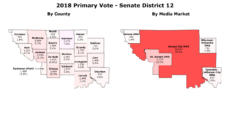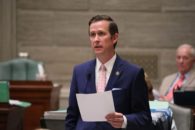JEFFERSON CITY, Mo. — The Federal Communications Commission (FCC) announced another wave of funding Monday — about $166.8 million — to expand broadband access to rural homes and businesses across the U.S. And in this latest wave, nearly 10,000 locations in Missouri are set to gain access.
The FCC selected more than 100 companies across the nation in an auction last summer to receive funding as part of a $1.5 billion initiative to bring broadband access to underserved and rural communities. Missouri was a state that benefited greatly from the auction, accounting for about 17 percent of total allocation.
Overall, 11 Missouri companies are expected to receive more than $254.8 million in subsidies over a decade to service more than 95,000 areas as part of the FCC’s Connect America Fund project.
On Monday, the FCC announced two companies will receive more than $24 million this month to service more than 10,000 homes and businesses; Co-Mo Connect was awarded $21,968,964 for 8,356 locations, and Callabyte Technology will receive $2,174,192 for 1,485 locations. Last month, the FCC allocated about $22.4 million to GoSEMO and United Services to service more than 7,000 locations in Missouri.
All will provide minimum speeds of 1 Gbps/500 Mbps.
FCC Chairman Ajit Pai said the funding will bring rural Missourians “to the right side of the digital divide and give them access to the 21st-century opportunities that broadband offers.”
Here is a breakdown by county — of eligible rural areas — of how the already-allocated funding will be divided over 10 years:
-
- Andrew: 1,372 locations will be serviced by United Services for more than $5 million
- Benton: 1,674 locations will be serviced by Co-Mo Connect for more than $3.9 million
- Buchanan: 1,337 locations will be serviced by United Services for more than $3 million
- Callaway: 1,485 locations will be serviced by Callabyte Technology for more than $2.2 million
- Camden: 61 locations will be serviced by Co-Mo Connect for more than $35,000
- Cape Girardeau: 1,044 locations will be serviced by GoSEMO for more than $1 million
- Clay: 178 locations will be serviced by United Services for more than $138,700
- Clinton: 302 locations will be serviced by United Services for more than $1.3 million
- Cole: 389 locations will be serviced by Co-Mo Connect for more than $518,000
- Cooper: 1,304 locations will be serviced by Co-Mo Connect for nearly $5.5 million
- DeKalb: 1,340 locations will be serviced by United Services for nearly $5.7 million
- Gentry: 310 locations will be serviced by United Services for nearly $1.7 million
- Mississippi: 219 locations will be serviced by GoSEMO for more than $478,000
- Moniteau: 1,849 locations will be serviced by Co-Mo Connect for nearly $6 million
- Morgan: 3,079 locations will be serviced by Co-Mo Connect for nearly $6 million
- New Madrid: 5 locations will be serviced by GoSEMO for more than $14,000
- Nodaway: 593 locations will be serviced by United Services for nearly $2.6 million
- Platte: 158 locations will be serviced by United Services for more than $654,000
- Scott: 180 locations will be serviced by GoSEMO for more than $116,000
- Stoddard: 335 locations will be serviced by GoSEMO for more than $507,000
“We are excited about the opportunity that the FCC is providing to rural America,” Co-Mo Connect CEO Andrew Bradshaw told The Missouri Times in a statement. “We know that connectivity is critically important to the success of our rural economy, and we will continue to look for opportunities to bring this important infrastructure to the underserved residents in the region.”
About 20 percent of Missourians do not have access to high-speed internet, according to Tim Arbeiter, the director of Broadband Development, part of the Missouri Department of Economic Development. This lack of access hinders communities on a variety of levels, Arbeiter said, from students’ educational opportunities to growing companies that might need to move elsewhere to truly expand to areas attempting to attract new businesses.
Aside from the Connect America Fund, Arbeiter said his office will soon begin to build out the $5 million broadband grant program for underserved areas the state legislature included in the recently-signed budget for the upcoming year. Gov. Mike Parson had made greater access to broadband a priority for his infrastructure and workforce initiatives, Arbeiter noted.
“We know it’s expensive. We know it’s a challenge,” Arbeiter said.
According to the FCC, providers need to build out to 40 percent of the assigned areas won in Missouri within three years. Then, the build-out must continue by 20 percent each year until completed by the sixth year.
The funding is part of the Connect America Fund auction, a broader effort by the FCC to bring more broadband access to rural places in the U.S. Pai also plans to create a Rural Digital Opportunity Fund, which would provide about $20.4 billion over the next decade to service about 4 million locations.

Kaitlyn Schallhorn was the editor in chief of The Missouri Times from 2020-2022. She joined the newspaper in early 2019 after working as a reporter for Fox News in New York City.
Throughout her career, Kaitlyn has covered political campaigns across the U.S., including the 2016 presidential election, and humanitarian aid efforts in Africa and the Middle East.
She is a native of Missouri who studied journalism at Winthrop University in South Carolina. She is also an alumna of the National Journalism Center in Washington, D.C.
Contact Kaitlyn at kaitlyn@themissouritimes.com.




















